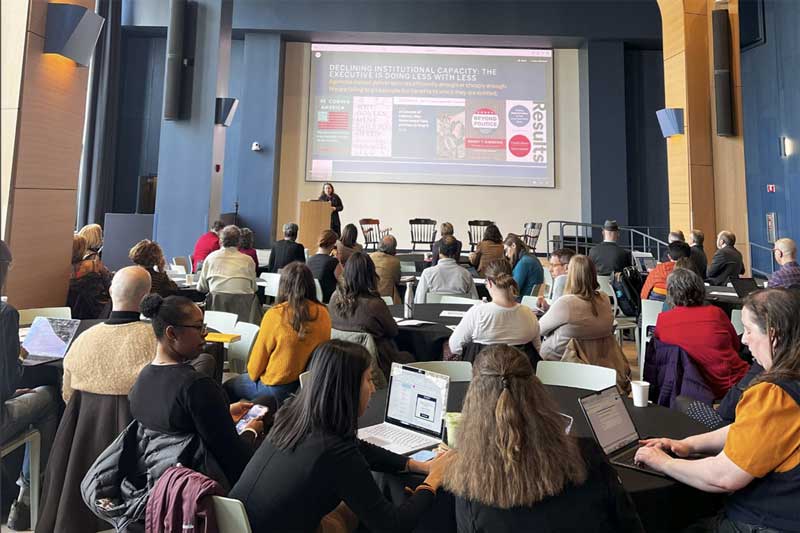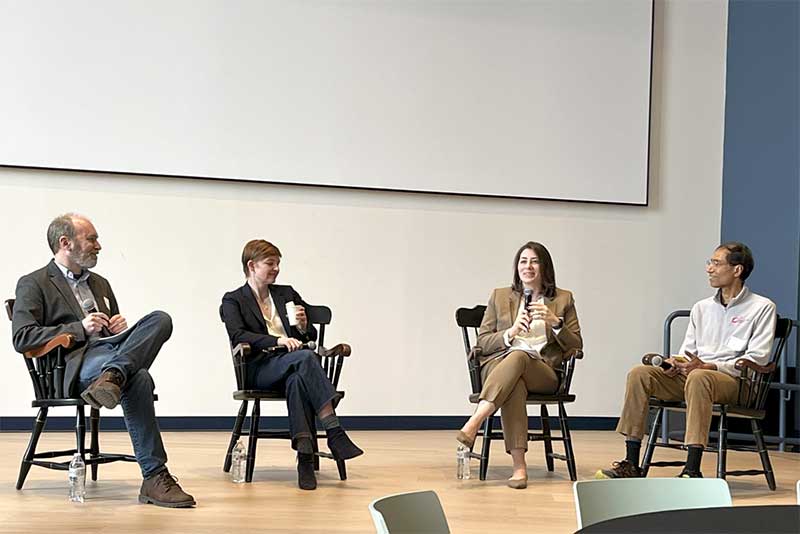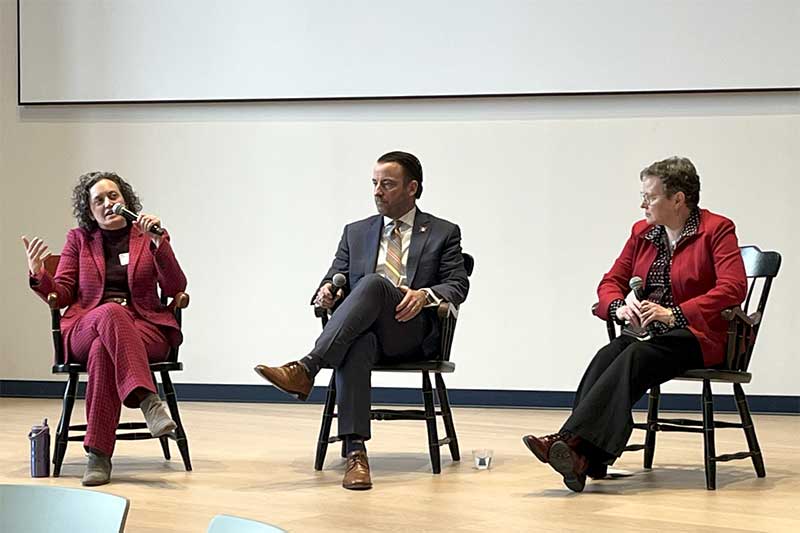Khoury policy roundtable: strategizing to maximize research impact
Author: Paul Murphy
Date: 03.27.25

On March 18, senior leaders and researchers from Khoury College, along with leaders from across Northeastern and outside organizations, gathered to explore ways to advance the college’s research and fulfill its mission of using computer science for the betterment of all. The policy roundtable, conceived last fall to more effectively amplify and extend Khoury research toward translational policy impact, was held on the Boston campus and broadcast across the Northeastern network.
“This event is about laying the groundwork for a long-term discussion and strategy to increase the impact of our work through broader collaborations and by building improved awareness of policy,” explained Khoury Dean Elizabeth Mynatt. “We hope this will be the first of many such events.”
The role of AI
The afternoon event contained three panel discussions and two plenary talks, with questions from in-person and virtual attendees sprinkled throughout. The opening plenary from Beth Simone Noveck, director of the Burnes Center for Social Change, discussed the changing political landscape and the evolution of AI.
“There is a tremendous amount we can do to ensure that technology is being used responsibly,” Noveck said, acknowledging that the US is not alone in wrestling with these complicated issues. “We can do more with AI to fix the problems of democracy than ever before.”
Noveck emphasized that AI can be used to study and enhance governance, deepen democracy, and improve daily lives; in particular, she noted its potential to support political candidates of all income levels, generate responsive ads, and identify misinformation more quickly.
Advancing policy in DC
Four Khoury faculty members — Alan Mislove, Laura Edelson, Malihe Alikhani, and Rajmohan Rajaraman — shared their experiences working and advising in Washington, DC. The group stressed that lawmakers are eager to engage with computer scientists to better understand how technology can be used to solve constituency problems.
Edelson noted that a life as a scientist requires commitment, so it’s important to pursue directions that align with your personal goals.

“We all have relevant expertise, and we all have to protect the institution that is science,” she said. “And we are called to do that.”
Alikhani pointed out that while the political environment is greatly contested, a lot of research, specifically AI, is nonpartisan. The group also cited policy underpinnings as foundational to research success, with Rajamaran stressing that policy-driven research involves foundational computing knowledge and an understanding of how research impacts people. Mislove recognized that while federal funding priorities are currently uncertain, researchers can look to state, local, and foundation funding to support policy-oriented research activities.
The importance of storytelling
Throughout the afternoon, participants pointed to the importance of sharing the stories behind the research, including who benefits, how they benefit, and what more is possible. Jack Cline, vice president for federal relations at Northeastern, shared that sometimes he has only five minutes to explain his case to an aide, who then has to relay it quickly to a legislator. A powerful story can go a long way in conveying the substance of complex scientific impacts.
Along these lines, Miriam Quintal, a lobbyist and managing principal at Lewis-Burke Associates, asked the scientists in attendance to share the stories of their research impacts. She noted that sharing research impacts make the work more personal and more local.
Christo Wilson, Khoury professor and associate dean of undergraduate programs, has created several videos online as a way to communicate his work and quickly synthesize information.
“We have the expertise to help, and we need to be able to boil information down to the basics,” he said.
Building and maintaining relationships
David Choffnes, associate professor at Khoury College, explained that it can be challenging to establish a foothold in the policy space. But, he said, these relationships are foundational to the long-term impact of research. Predrag Radivojac, associate dean for research, agreed, and emphasized that not all efforts that influence policy are government related. For instance, his computational biology work has influenced guidelines for the use of algorithms in diagnosing genetic diseases.
Northeastern’s interdisciplinary approach is also key to building relationships, sharing ideas, and enhancing communication, said Sina Fazelpour, assistant professor at Khoury College and the College of Social Sciences and Humanities.
Changing political landscape
Quintal provided a briefing on the current state of science funding and programs. She acknowledged that this is a challenging time for academia, with many unknowns and ongoing legal challenges. But she also highlighted several research priorities on the horizon, including national security, AI, quantum computing, advanced computing, advanced communications, and biotechnology.
“Government needs science,” she said, emphasizing the need to be strategic and to “focus on the outcome, not the how.”
Takeaways and next steps
Throughout the afternoon, several next steps were discussed, including inviting policy makers and PhD students to future events, asking policymakers to share their big concerns, and tapping business leaders for their expertise.
“Any policy requires public engagement,” stressed keynote speaker Maria Ivanova, director of the School of Public Policy and Urban Affairs “What footprint or what handprint will we each have?”
“Today’s discussion was amazing,” Mynatt added. “So many great ideas about policy engagement were shared, and I look forward to where we go from here.”

The Khoury Network: Be in the know
Subscribe now to our monthly newsletter for the latest stories and achievements of our students and faculty